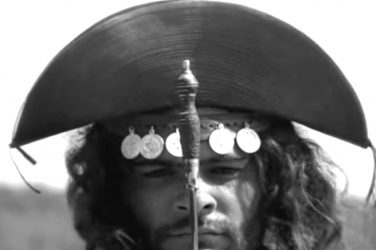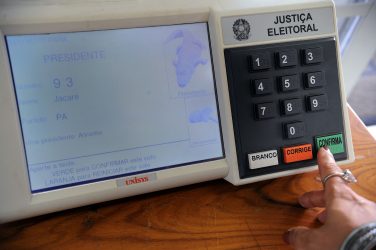Brazil’s military has taken full control of security in Rio de Janeiro and the surrounding state in an effort to fight gang violence. The move comes after the Defense Ministry said security in the city was “broken.”
President Michel Temer has signed a decree giving the military control of security in Rio de Janeiro in response to spiraling drug gang violence.
The military already supports police in favelas, large slums overrun by drug gangs. It had previously helped provide security during the 2014 World Cup and 2016 Summer Olympics.
But the decree, which went into effect immediately, hands the military power over all police operations in Rio state. It must be approved by both chambers of Congress within 10 days.
“Organized crime nearly took over in the state of Rio de Janeiro. This is a metastasis that is spreading in our country and it threatens our people. That’s why we decided on the intervention,” Temer said at the presidential palace in Brasília. “Our administration will give a tough, firm answer.”
The military mission will last until the end of the year.
Broken Security
The dramatic decision in a country that was ruled by a military dictatorship from 1964-1985, comes after Defense Minister Raul Jungmann said last month that “the security system is broken.”
On Friday, he said the decree will put in place “a more robust, better coordinated security system, with a better intelligence service.” It would not impact the country’s democracy, he said.
Highlighting the dire state of security in Rio, Carnaval in recent years was marked by violence and muggings.
“The total confusion and lack of coordination of the security forces during the Carnaval” prompted Temer’s decree, David Fleischer, professor of political science at the University of Brasilia, told the Agence France-Presse.
Arthur Trindade, a university professor and former security secretary for Brasília, told AFP the decree is also aimed at cleaning up a corrupt police force.
Other Motives
Former National Security Secretary José Vicente da Silva told The Associated Press that the military invention would help, but not totally end systemic drug gang violence.
“Rio state can’t solve this any time soon and the military could be effective in keeping some smaller groups that have operated lately off the streets,” da Silva said.
Analysts say the move is also an attempt to distract from Temer’s single-digit poll numbers and failure to advance pension reform ahead of a general election scheduled for October.
The military intervention also raises questions over accountability. If soldiers commit crimes during patrols, they will not be tried by civilian courts. It is the first time the military has taken control of a state’s security since the return to democracy in 1985.
Military Control
The army will now have primacy over the state police, a situation unheard of since the country’s return to democracy in 1985 after two decades of military rule.
“I am taking these extreme measures because circumstances demand it,” Temer said after signing the decree to combat seemingly endless waves of gang-driven violence.
“The government will give tough and firm answers, taking all necessary measures to eradicate organized crime.”
He described organized crime as “a metastasis that spreads through the country and threatens the tranquility of our people.”
“We cannot passively accept the death of innocents,” Temer said in a speech at his Planalto palace in Brasilia in which he outlined the human cost of the violence.
“It is intolerable to be burying fathers and mothers, workers, policemen, young people and children and seeing whole neighborhoods besieged, schools in the crosshairs of rifles and avenues transformed into trenches.”
Chamber of Deputies head Rodrigo Maia – who took part in a preparatory meeting with Temer on Thursday – described the move to reporters on Friday as “hard and extreme”.
Rio state Governor Luiz Fernando Pezão issued an apology on Wednesday after the Carnaval in Rio was marred by violence and muggings: “We were not ready. There were mistakes in the first days and we reinforced the patrols.”
Jungmann had predicted a sharp response after meeting Temer.
“It is clear to us that the situation in Rio during the Carnaval was unfortunate,” he said. “New measures will be announced.”
Responsibility for security in Rio will now fall to General Walter Souza Braga Neto, who was the man in charge of coordinating security when the city hosted the 2016 Olympic Games. The army’s mission will last until the end of Temer’s term as president, December 31.
The decree will put in place “a more robust, better coordinated, security system, with a better intelligence service,” the defense minister said.
Jungmann added however that the army would not replace the police on the ground, but provide logistical support in their fight against the drug lords.
PT Warns
Brazil’s Workers’ Party, or PT, has released an official statement calling the recent federal troop intervention in the state of Rio de Janeiro “a dangerous step aimed at the consolidation and worsening the of a state of emergency in Brazil.”
The document was signed by senator and PT president Gleisi Hoffman, as well as PT lawmakers Lindbergh Farias and Paulo Pimenta.
“Nobody can exclude the relationship between the worsening of the security crisis and the weakening of the state, bankrupt due to a harsh fiscal adjustment promoted by the government of (Michel) Temer and intensified by the state government of PMDB (Brazil Democratic Movement),” the statement said.
“The Workers Party’s directorate and its delegates in the National Congress affirm that the coup government is not really worried about the security of the population, but only with its political survival.”
The statement went on to note that the measure was aimed at circumventing political obstacles such as the approving of Temer’s “destructive” pension reform and his “extremely low popularity.”
The document concluded that the people of Brazil, “particularly the poorest of people, demand and deserve the responsible participation of the federal government as it relates to Public Security, implementing sound programs and efficient politics, but repudiates pyrotechnic measures of mere propogandistic effects.”
Emergency
Brazil will declare a “state of social emergency” and double troop numbers in the northern state of Roraima in response to an influx of Venezuelans fleeing an economic and political crisis in the country, the government said.
The declaration will provide funding for infrastructure and a humanitarian response in the northern Amazonian region after 40,000 Venezuelans in recent months fled to Boa Vista, the capital of Roraima.
The military will also double troops in the area to 200, erect more control posts and establish a field hospital for migrants.
The migrant influx has overwhelmed Boa Vista, a city of nearly 400,000 people. Many Venezuelans are living in the streets.
There are growing concerns among local residents about crime and Venezuelans taking jobs away from Brazilians.
Two residences housing Venezuelans were set alight last week — five people were injured.
Brazilian President Michel Temer visited Roraima to asses the crisis situation and promised a government response. The president suggested that some migrants could be moved to other states, but insisted that Brazil would not turn its back on the people fleeing misery.
Economic collapse and hyperinflation have devastated oil-rich Venezuela and sent many people into abject poverty, with basic goods and services lacking.
More than 550,000 Venezuelans have also fled to neighboring Colombia.
DW, teleSUR, MP














